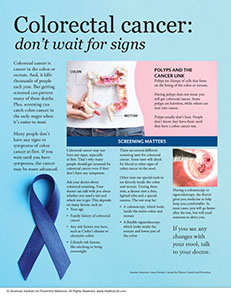SYMPTOM CHECKER
CONDITIONS
Male
Female
Child
Arm, Hand & Shoulder Concerns
Legs & Feet Concerns
Dental & Mouth Concerns
Ear & Nose
Eye Conditions
Head Conditions
Arm, Hand & Shoulder Concerns
Legs & Feet Concerns
Front
Back
Arm, Hand & Shoulder Concerns
Dental & Mouth Concerns
Ear & Nose
Eye Conditions
Head Conditions
Arm, Hand & Shoulder Concerns
Dental & Mouth Concerns
Ear & Nose
Eye Conditions
Head Conditions
Front
Back
Arm, Hand & Shoulder Concerns
Neck Links
Head & Neck Concerns
Arm, Hand & Shoulder Concerns
Neck Links
Head & Neck Concerns
Front
Back
Online Clinic
Wise Healthcare
Colorectal cancer: don’t wait for signs
Print on Demand
Colorectal cancer is cancer in the colon or rectum. And, it kills thousands of people each year. But getting screened can prevent many of these deaths. Plus, screening can catch colon cancer in the early stages when it’s easier to treat.
Many people don’t have any signs or symptoms of colon cancer at first. If you wait until you have symptoms, the cancer may be more advanced.
Polyps and the cancer link
Polyps are clumps of cells that form on the lining of the colon or rectum. Having polyps does not mean you will get colorectal cancer. Some polyps are harmless, while others can turn into cancer.
Polyps usually don’t hurt. People don’t know they have them until they have a colon cancer test.
Screening matters
Colorectal cancer may not have any signs, especially at first. That’s why many people should get screened for colorectal cancer even if they don’t have any symptoms.
Ask your doctor about colorectal screening. Your doctor can talk with you about whether you need a test and which test to get. This depends on many factors, such as:
• Your age
• Family history of colorectal cancer
• Any risk factors you have, such as Crohn’s disease or ulcerative colitis
• Lifestyle risk factors, like smoking or being overweight
There are several different screening tests for colorectal cancer. Some tests will check for blood or other signs of colon cancer in the stool.
Other tests use special tools to see directly inside the colon and rectum. During these tests, a doctor uses a thin, lighted tube and a special camera. The test may be:
• A colonoscopy, which looks inside the entire colon and rectum
• A flexible sigmoidoscopy, which looks inside the rectum and lower part of the colon
During a colonoscopy or sigmoidoscopy, the doctor gives you medicine to help keep you comfortable. In most cases, you will go home after the test, but will need someone to drive you.
If you see any changes with your stool, talk to your doctor.
Sources: American Cancer Society, Centers for Disease Control and Prevention
RELATED ARTICLES
This website is not meant to substitute for expert medical advice or treatment. Follow your doctor’s or health care provider’s advice if it differs from what is given in this guide.
The American Institute for Preventive Medicine (AIPM) is not responsible for the availability or content of external sites, nor does AIPM endorse them. Also, it is the responsibility of the user to examine the copyright and licensing restrictions of external pages and to secure all necessary permission.
The content on this website is proprietary. You may not modify, copy, reproduce, republish, upload, post, transmit, or distribute, in any manner, the material on the website without the written permission of AIPM.
2021 © American Institute for Preventive Medicine - All Rights Reserved. Disclaimer | www.HealthyLife.com
















































